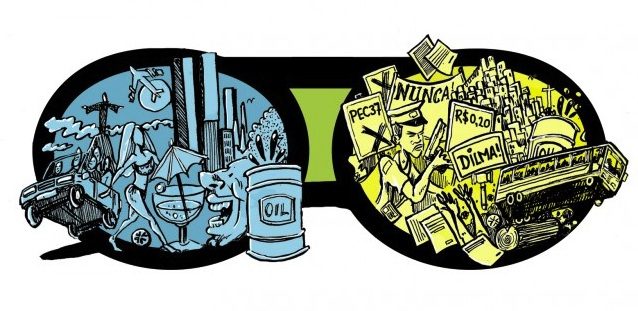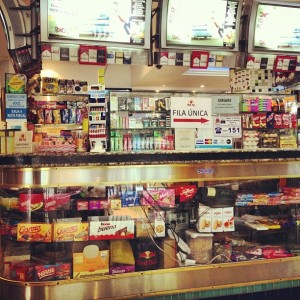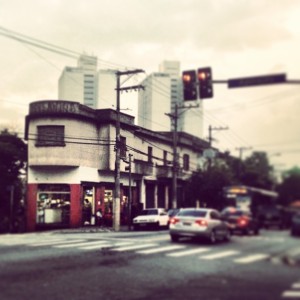Mark Hillary is a British journalist, blogger and advisor on globalisation living in Brazil since 2010. His book Reality Check: life in Brazil through the eyes of a foreigner is an impressive analysis of modern life in the country.
Published in 2013, Reality Check has also been spotted in the “Amazon Top 20 for books about Brazil” and it’s definitely a helpful and frank resource for foreigners who want to know the pros and cons of living in such a diversity place.
I particularly think this is a book to be in the reading list of any Brazilian citizen because sometimes it’s very important to have a second opinion about the way we see our nation.
Midlands Trade: Why writing about Brazil? And what did inspire you to write this book?
Mark Hillary: In the middle of 2013 an expression became common in Brazil “Imagina na Copa” (Imagine the cup!) It was used to expression frustration about anything and suggested that if you think it is bad now then just imagine how awful things will be in 2014 when Brazil hosts the World Cup.
People used this expression about the traffic, crime, anything. It became common for foreigners to publish lists on Facebook such as “30 reasons why I hate living in Brazil.”
I was seeing all this negativity and yet, I like living in Brazil. I went to the first big football match at the Maracanã stadium in Rio when it reopened in 2013 – England v Brazil – and it was a fantastic experience that reminded me of the London 2012 Olympics.
I just got fed up of listening to other foreigners endlessly whining about Brazil so while my wife was away visiting a university in Spain for a week I used some free time to build a framework for the book.
It was never going to be an authoritative history of Brazil or a guide to moving to Brazil, but I felt that having bought a home, started a business, and worked on several diplomatic programmes, I have done a lot more than the average gringo who teaches English for 6 months because they want to hang out on the beach.
Midlands Trade: Talking about the name of the book, why “Reality Check”?
Mark Hillary: Although the catalyst for me to sit down and write something was my displeasure at listening to the foreign community complaining about Brazil, I also didn’t want to just create a hagiography. Brazil does have many issues that would be unusual or challenging for someone moving from Europe or the USA.
The bureaucracy that still exists around some basic processes like getting a bank account, starting a business, or renting a property when you don’t know anyone in the city who can guarantee that you will pay can sometimes be stifling.
So I wanted to respond to many of the critics by pointing out that it is possible to succeed in Brazil, but both sides of this debate really should take a reality check and look at the facts – not just the nonsense shared on Facebook.
Midlands Trade: Besides the fact your wife is Brazilian, what else contribute to your decision of moving to Brazil?
Mark Hillary: My wife had lived in Europe for ten years so the primary driver was her desire to spend some time back at home after a long time away – we were already married in the UK. The amount of work that I was getting had dropped significantly after the global economic crash so by 2009/2010 I was ready to explore a new environment anyway. Additionally, Brazil has many natural factors that make it a welcoming place to be sure as the culture, the attitude of the people, the weather, and the natural environment.
Midlands Trade: Do you believe that for understanding such diverse country like Brazil is necessary to immerse yourself in the famous “Jeitinho Brasileiro”?
Mark Hillary: It helps a lot to have access to a Brazilian family member or close friends. They can introduce another side of life in Brazil and the legendary jeitinho is one example of where foreigners can often go wrong. As I mentioned, there is often inexplicable bureaucracy around many basic functions – certainly any interaction with the government. I think we can safely blame the Portuguese for most of this and things are improving slowly, but anyone used to services such as the gov.uk website or the concept of a ‘citizen’s charter’ will be surprised.
However, the jeitinho is the attitude that the rules can always be bent a little here and there – there is always a better way through the problem than the solution we see documented in black and white. Quite often this comes about through the very personal nature of many interactions in Brazil. A good example is when I wanted to get a mortgage to buy a house. The bank takes your last 90 days current account activity very seriously, they scrutinize all your regular bills and income.
My 90-days coincided with the London 2012 Olympics and I had spent a month in London enjoying the games, so there was only the bare minimum of activity on my account in Brazil. The bank told me to reapply again when I could show a “normal” kind of lifestyle. But the branch manager got on the phone and overruled his headquarters, telling them that he knew me, he saw my account activity all the time and he would vouch that I earn enough for the mortgage. That kind of personal banking has all disappeared in the UK.
 Midlands Trade: We usually see a very pessimistic view of Brazil from both sides – foreigners living in Brazil and Brazilians living abroad. What is your opinion about it?
Midlands Trade: We usually see a very pessimistic view of Brazil from both sides – foreigners living in Brazil and Brazilians living abroad. What is your opinion about it?
Mark Hillary: It’s easy to stereotype the gringos in Brazil and the Brazilians abroad, but I have met many and if I was summarizing it to someone who is less familiar with Brazil then I would say that many of the Brazilians who live overseas contrast the country unfairly with their new home.
London is so much safer or New York has more of a food culture than São Paulo. They endlessly talk down their own country and yet what often drives their dissatisfaction is that they want to see Brazil catch up, but it is not happening fast enough.
There are many reasons for this – and it can easily become a political argument – but Brazil is only recently wealthy, only recently democratic, and wealth is very unevenly distributed.
In São Paulo there are areas that resemble European capitals – Prada and Burberry shops next to chic bars – yet in the north of the country many states face a situation where the majority of people live on less that the national minimum wage.
Even the Brazilians inside Brazil who argue for faster change are often blinkered and don’t appear to understand their own country – as they argue for cheaper cars and imported electronic products there are millions of people who still need to be brought into the consumer economy.
I don’t have much time for the foreigners who live inside Brazil and complain about it. Sometimes there are valid complaints – like why we cannot enjoy more political transparency – but on many occasions bloggers will waste space on the Internet talking about the best place to buy peanut butter or “real” ketchup.
When I was on holiday in Thailand once I was looking for a place to eat lunch and I stumbled into a Mexican restaurant. The waiter had never heard of guacamole and the food was awful. But why should I have expected great Mexican food on a Thai island anyway?
Midlands Trade: What was your biggest challenge since 2010, when you moved to Brazil?
Mark Hillary: Very few people speak English. Naturally it is the responsibility of the person who locates to a country to learn the language there, but there is a difference between learning Portuguese well enough for business proficiency and being able to make new friends and really interact with people.
When I first arrived I was so busy with work that I was already a couple of years in the country before I really knuckled down and started focusing more on learning Portuguese. If I could go back to 2010 again then I would definitely have taken on less paid work so I could free up time for the language training because it is very hard to get by without using Portuguese – in business and in personal situations.
Midlands Trade: What about your work experience as a journalist abroad. Was it difficult for you to get into the market? What do you think about the Brazilian media?
Mark Hillary: I just work internationally anyway. I have clients all over the place from the US to UK to Belarus and France. I have worked with some local clients, but I’m not really embedded into the Brazilian media environment. There has been an explosion of blogs and alternative journals that have nothing to do with the traditional media groups and I think they are going to find it hard to adjust to a very innovative online media environment.
About 18 months ago I went to the offices of Folha to lecture the new journalism recruits on the future of journalism. As I finished speaking one of the new recruits put up his hand and said “our boss told us the exact opposite of everything you said…” It’s fine. Nobody can really predict the future of media so other opinions are available.
Midlands Trade: What are the pros and cons of living in Brazil?
Mark Hillary: Cities like São Paulo and Rio are big, international cities with world-class food and entertainment. I don’t miss out on things like seeing a Bruce Springsteen gig or eating out at great restaurants. And local costs are low – food and drinks, things that are locally produced. I can eat a fantastic lunch in a restaurant everyday for less than the price of a sandwich in Pret a Manger. And this is Brazil so there are thousands of kilometres of beaches, mountains, countryside, and amazing areas of natural beauty such as the Pantanal wetlands.
The cons for a foreigner from a country like the UK is that it is a long flight home. It’s not so bad for me as I get to visit the UK several times a year for work, but my family has never visited and none of my friends have visited. The cost of one person flying from London to São Paulo and back is probably similar to the cost of an entire family holiday in Europe so it is hard to convince people that they should come over.
Midlands Trade: What do you like most about Brazil?
Mark Hillary: The Brazilian people – in general – are very relaxed, friendly, more in tune with the important things in life. They make British people especially welcome because Brazilians love music so it’s easy to meet anyone and ask if they like The Beatles, Pink Floyd, Iron Maiden, Led Zeppelin, Ed Sheeran… there will always be at least one British artist that they love!
Midlands Trade: What do you miss most about the UK?
Mark Hillary: The thing I do miss is the live music culture. São Paulo has a great local live music scene, probably the best in Brazil, but as soon as a band draws a bit of a crowd the prices soar and international artists are very expensive to see – some tribute bands are more expensive to see in São Paulo than the real thing in London.
Back in the UK I liked it that it was possible to follow a lot of small bands for free in pubs and then to small venues, watching them grow in stature without the promoters suddenly wanting £100 a ticket.
Midlands Trade: Talking about globalisation. Considering it`s an under developed country yet, do you think Brazil is a globalised market?
Mark Hillary: Brazil is globalised in many ways, but at heart there is still a quite paternalistic approach to government. Industries like auto manufacturing are fiercely protected with tariffs and barriers and it’s not easy to set up a business that wants to expatriate most of the profits.
This may all change after the next election if a wave of market reform ends the long rule of the Worker’s Party, but I also fear that sudden change would be dangerous. There is not a mature social safety net so cities would find it tough to handle thousands of layoffs in industries such as manufacturing.
Personally I think the jury is still out on all of this. The Lula/Dilma focus has always been on raising people out of poverty and creating jobs even if their actions conflict with the free market.
Most liberal economists would argue that their focus is all wrong and jobs would be created by more market freedoms, but is it so bad to focus on the jobs? Repeating 2008 all over again doesn’t appear to be the answer either, but that seems to be what many still believe.
Midlands Trade: If you would write another book about Brazil, what would it be about this time?
Mark Hillary: I think I would need to be more specific, to find a particular angle, but it would also need to be something that I am very involved in so I could imagine writing something about music and crowdsourcing in Brazil. This combines my interests in technology, music, and the fact that Brazil has seen some of the most innovative uses of crowdsourcing in the world.
Midlands Trade: What are your projects for 2015?
Mark Hillary: I already published one book in 2015 – about blogging. I’m working in South Africa, the UK, and Portugal in the next few months and I plan to publish another book about the way that social media has changed customer service in around the middle of the year. After that I might even try writing some stories instead of another non-fiction title!
[qpp]





